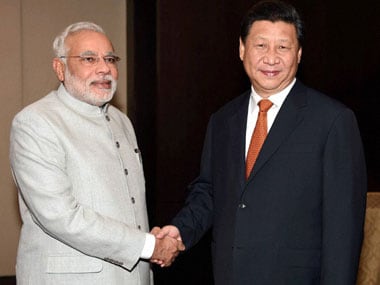Before the exchange of pleasantries that will inevitably follow when Prime Minister Narendra Modi visits China, India has chosen to take on its neighbour for the development of infrastructure in Pakistan-occupied Kashmir. According to an Indian Express report, the issue has been taken up in New Delhi and Beijing. A Hindu report said that while Foreign Secretary S Jaishankar didn’t mention when the protest had been lodged, Chinese ambassador Le Yucheng in Delhi had been informed of India’s displeasure, while the Indian ambassador in China had conveyed the same to the Chinese Ministry of Foreign Affairs. [caption id=“attachment_2241460” align=“alignleft” width=“380”]  A file image of Modi and Jinping. PTI image[/caption] Opposition to the $46 billion deal signed in April by Chinese President Xi Jingping to develop a superhighway to Pakistan comes just before the Indian Prime Minister’s much publicised three-day trip to China. Analysts had earlier flagged the project as of concern to the Indian government and likely to feature in the bilateral talks between the two nations. “The China-Pakistan Economic Corridor (CPEC) directly affects India’s security interests because it passes through Pakistan occupied Kashmir and Gilgit-Baltistan - India has steadfastly opposed any international involvement in these areas,” Sameer Patil, associate fellow at think-tank Gateway House said in a statement The opposition to the deal comes even as an editorial in a Chinese state-run newspaper accused the Indian Prime Minister of indulging in “little tricks over border disputes and security issues”. It advised Modi to no longer visit Arunachal Pradesh in ‘pursuit of his own political interests’ and to not deliver any remarks that will hurt the relationship with China. Not surprisingly, the Indian government has chosen not to comment on the editorial, with the Prime Minister instead focussing only on bilateral ties in an interaction with Chinese journalists. “I had a wonderful interaction with the Chinese media. Several issues were discussed during the interaction,” he said in a tweet posted on his Chinese microblog account Weibo. “I highlighted the immense scope for further growth in India-China ties. We should pool our strengths to help the developing nations to move ahead and eradicate poverty,” he said. “It is acknowledged that the 21st century will be Asia’s century. Asia is the land of Buddha. It is therefore, Asia’s responsibility to ensure that this century is the one which delivers freedom from war,” he said. The sparring over border relations and other issues aren’t going to be the first item on Modi’s agenda when he lands in China on 14 May, but there will be greater pressure on the Indian Prime Minister this time round to go beyond the usual optics. As Firstpost's Rajeev Sharma pointed out in a piece earlier, the Indian Prime Minister will have to focus less on razzle dazzle of meets like the one planned for him in Shanghai and more on getting China to deliver on promises made during Jinping’s visit to India last year. Jinping had promised investments to the tune of $20 billion when he came calling last year. The Indian Prime Minister will also be under pressure to take up issues ranging from the boundary dispute, stapled visas for Indians from Arunachal Pradesh and the presence of Chinese troops in Pakistan-occupied Kashmir. By prominently flagging the issue of the PoK project on the eve of his departure, the Prime Minister may just be signalling his intent to confront the thornier side of diplomacy, and move beyond the usual Hindi-Chini bhai bhai slogans.
The opposition to the $46 billion deal signed in April by Chinese President Xi Jingping to develop a superhighway to Pakistan comes just ahead before the Indian Prime Minister makes a much publicised three-day trip to China.
Advertisement
End of Article


)

)
)
)
)
)
)
)
)



